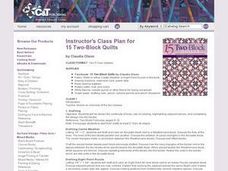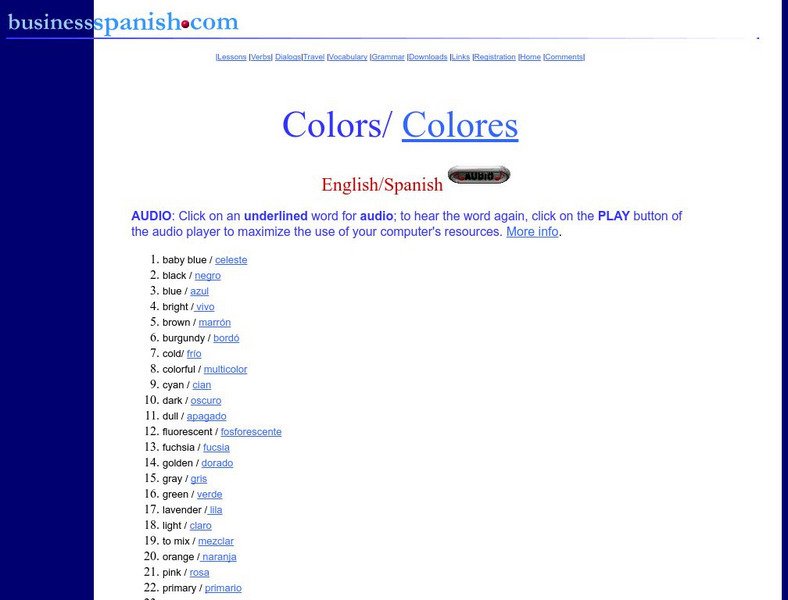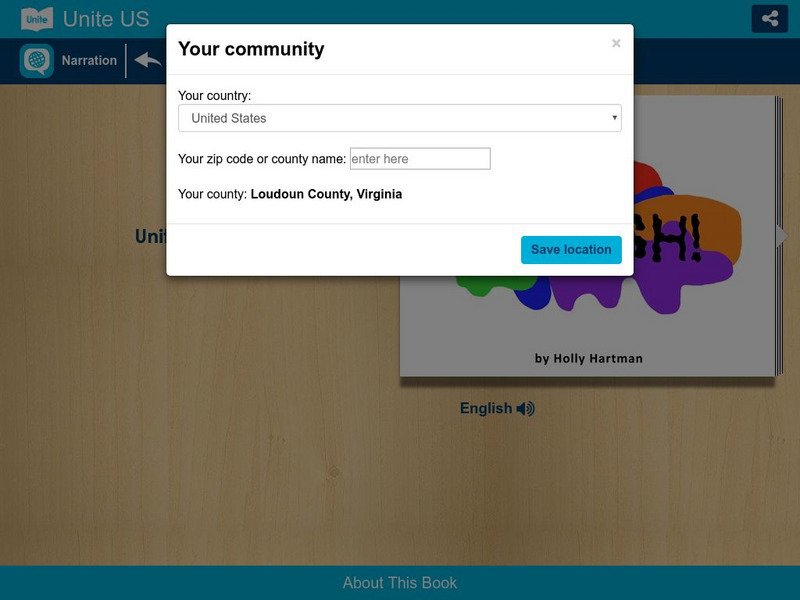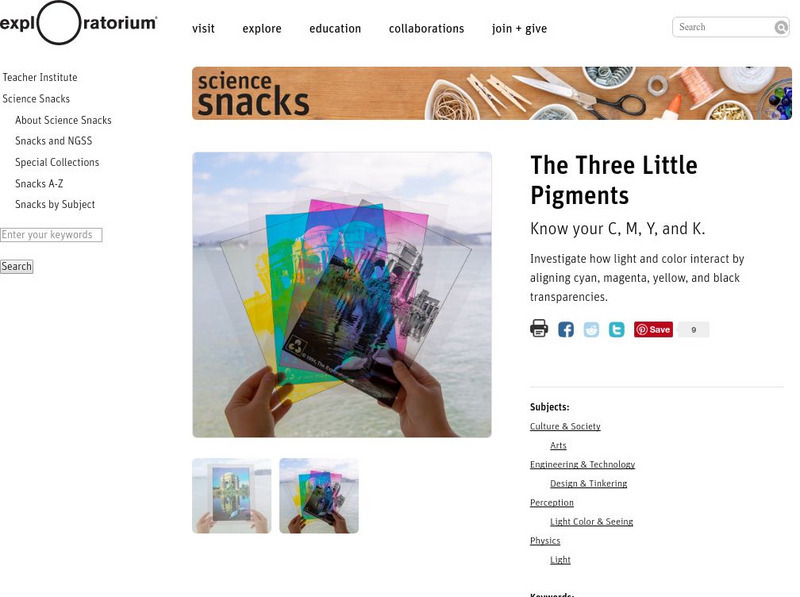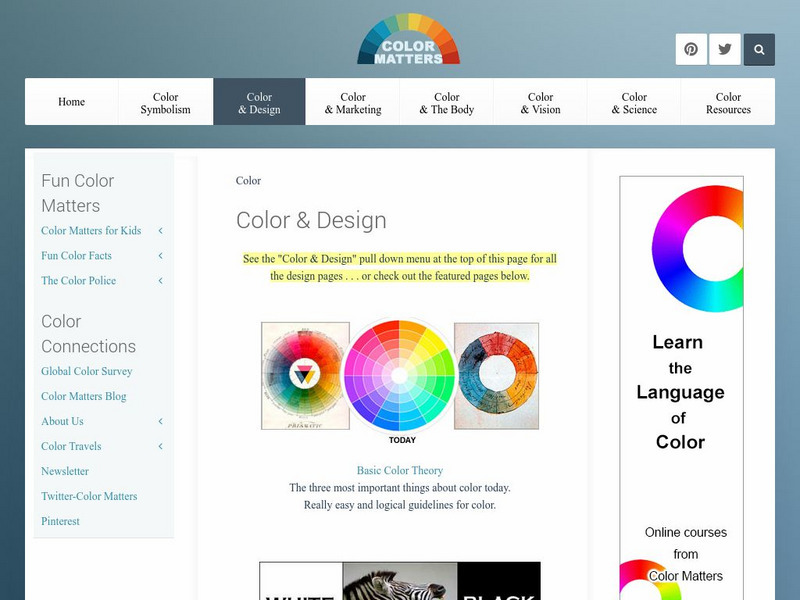Curated OER
Finding Your Feelings
Students examine different slides of artwork from different artists. They discuss how art can show feelings and emotions. They share their opinion of the artwork.
Curated OER
15 Two-Block Quilts
Young scholars create two block quilts after studying about continuity of lines, use of coloring, and highlighting adjacent pieces. Students complete the design into the border. Young scholars cut the required material pieces to create...
BusinessSpanish.com
Business spanish.com: Colors/colores
From primary to secondary, this site has great colors that are translated from Spanish to English. You can also hear the pronunciation by clicking on the color you want to hear. Bilingual.
ClassFlow
Class Flow: Color Mixing
[Free Registration/Login Required] This is an elementary primer to mixing colors in art and is a great resource for beginning artists with activity pages for kids to demonstrate their understanding of primary and secondary colors.
Alabama Learning Exchange
Alex: Leo Lionni's a Color of His Own
Students will summarize a Leo Lionni story through drawing and writing. Students will also mix the three primary colors to make secondary colors.
Minneapolis Institute of Arts
Arts Connect Ed Artist's Toolkit: Primary and Secondary
An interactive site that explores the elements and principles of visual art through the artist's toolkit. This lesson is on the color wheel and it studies both primary and secondary colors using Grace Hartigan's "Billboard." The...
Unite for Literacy
Unite for Literacy: Create and Play: Squish!
A book about the primary and secondary colors. Includes audio narration in 16 additional languages with text in English.
Science Education Resource Center at Carleton College
Serc: Rainbow Milk
This activity is designed for students to learn that primary colors mixed together make secondary colors. They will also experiment with how fat and soap molecules repel each other in water.
Other
Mixing Mouse Tracks
This art idea is based off the children's book "Mouse Paint" by Ellen Stoll Walsh. A fun way to introduce young learners to the primary and secondary colors through simple mixing exercises.
NumberNut
Number Nut: Basic Topics: Shapes, Symbols, and Colors: Colors
A short explanation of how we see color and what each of the primary and secondary colors symbolize.
University of Manchester
Children's University of Manchester: Talking Textiles: The Color Wheel
Interactive resource explains primary, secondary, tertiary, and complementary colors, the symbolic content of color, and the relationship between color and mood.
Exploratorium
Exploratorium: Science Snacks: The Three Little Pigments
For this activity, you print different colors of the same image onto acetate, then explore the different color effects you get when they are overlaid on each other in various combinations.
Other
Color Matters: Color and Design
This site discusses color and how it works in art, science, and the mind. Explore the many ways that color affects us.
Other
Well styled.com: Webdesigner Tools: Color Scheme Generator
A totally cool concept! Choose your base color, your scheme (monochromatic, etc.) and the computer will show you what other colors go with it! There are even settings for various levels of color-blindness. A really cool art tool!!
Other
Watercolor painting.com: Color Theory
A great introduction to color theory with colorful illustrations and examples.
Quia
Quia: Color Theory
Four activities quizzing vocabulary terms about the usage of color in art. Matching, concentration, flashcards, and a word search are available. Teachers can use these to supplement their lessons, or to help students review for a test.
Physics Classroom
The Physics Classroom: Color Addition
This tutorial on the addition of color to light discusses the primary, complimentary, and secondary colors of light.
ArtLex
Art Lex: Color
An in-depth instructional page on color that defines a variety of terms related to color.
PBS
Pbs Learning Media: Math + Arts: Shapes Into Sculptures
In this lesson, students will identify 2- and 3-dimensional shapes as well as create shape drawings and sculptures. Teacher materials are available.
Science Struck
Science Struck: Color Spectrum Chart With Frequencies and Wavelengths
Read about the visible light spectrum and learn the frequencies and wavelengths for each of the primary and secondary colors.
University Corporation for Atmospheric Research
Ucar: About Rainbows
This site from the University Corporation of Atmospheric Research provides an illustrated article about the phenomenon of rainbows.
ClassFlow
Class Flow: Color Theory
[Free Registration/Login Required] This flipchart introduces students to the concept of primary, secondary and tertiary colors. The lesson concludes with an activity in which students create their own color wheel from mixing colors and...
University of Colorado
University of Colorado: Physics 2000: Temperature and Absolute Zero
A thorough, multipage discussion of color and color television sets that explains how an image is formed on the television using red, green, and blue light. Understandable discussion, excellent graphics, and many interactive Java applets.
Curated OER
The Colour Wheel
A review of terms associated with the study of color as an element of art: spectrum, hue, color wheel, primary colors, secondary colors, tertiary colors, complementary colors, and analogous colors.
Other popular searches
- Primary and Secondary Colors
- Primary & Secondary Colors
- Creating Secondary Colors
- Primary Secondary Colors
- Secondary Colors and Wax
- Science, Secondary Colors
- Science Secondary Colors
- Primary/secondary Colors



